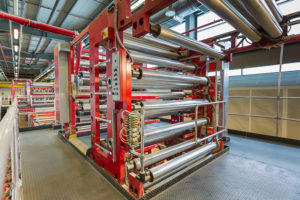

Thermal machines in the rubber and plastic industry are employed both for machinery and process cooling, bringing back plastic materials at a solidification temperature after its processing. The major part of cooling capacity is required by the cooling of machinery, hydraulic drives, which require hydraulic oil at a constant temperature of 40-50° C, plastic coating chambers, wire drawing machines, mills. Here, cooling water is needed at a temperature of 35° C, that can be obtained using an evaporative tower. The thermal duty involved makes chillers and air condensed refrigeration groups an excessive energy consuming solution, because these are system that work with water temperature levels under 15-20° C, too much low for this application. Free cooling systems are therefore an optimal energy-saving option, being the perfect solution for the air/water thermal transfer and for the machine cooling, able to maintain water at a temperature of approximately 5° C above the ambient air temperature, when correctly sized.
Process cooling within the plastic industry requires instead a cooling process aimed to guarantee an acceleration in the cooling time of the processed materials, in order to obtain an improvement in the production capacity and the repeatability of the same quality standards. A cooling system able to ensure and maintain the very same precise cooling conditions is therefore required, and the only feasible solution is represented by a chiller with industrial compressors, equipped with switching valves that allow to manage the different temperature levels of the diverse production process’ steps, achieving the right temperature exactly where it’s needed. Anyway, proceeding with a good analysis of the production requirements and the ambient conditions of the installation area, a free cooling system can be implemented even in this application, gaining significant advantages especially when used during the cold season leveraging the lower temperatures of the ambient air, then switching off the compressors serving the chiller.
A last interesting application of free cooling is represented by heat exchangers in free cooling systems employed for textile machines cooling. Textile workshops require conditioning levels to maintain controlled temperatures and humidity, ensuring a constant and fast production, also considering the amounts of heat generated by the hydraulic components of the machinery that gets dissipated in the working setting. In addition, in an environment too much dry threads are subject to breaking, while an excessive humidity damages the product. Conditioning is usually achieved using air and locally installed radiators, but this is a solution that weighs very much on the thermal duty of conditioning plants and therefore on the power absorbed by the dedicated chiller compressors. Is it instead possible to convey this heat on the outside of the workshops, bringing it out of the production area using a cooling thermal transfer fluid. This heat can then be dissipated with evaporative towers or using heat exchangers in free cooling mode, lowering the thermal duty of the conditioning systems of the textile workshop, thus gaining remarkable energy savings.
